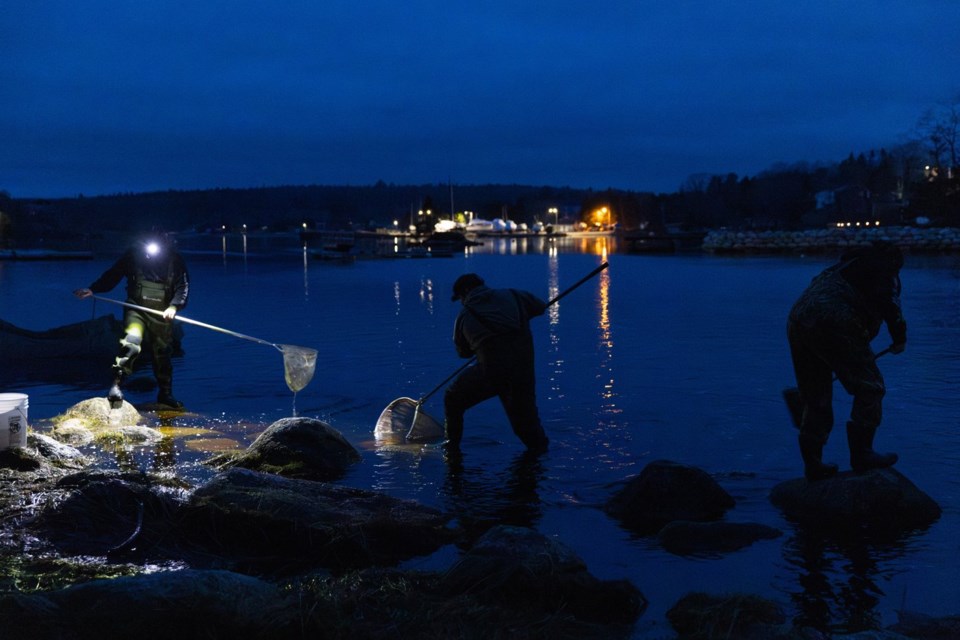HUBBARDS — As night falls along the banks of the Fitzroy River, Tabitha Morrison pauses from dipping her net for baby eels, and explains why she believes Ottawa's rules shouldn't govern Indigenous fishers.
"We're out here trying to make a living," said the Mi'kmaq fisher in an interview Tuesday about 50 kilometres west of Halifax, where headlamps of 15 other fishers intermittently brightened the tidal waters.
"There are catch limits we follow .... We have the right to self-govern ourselves and that's exactly what we're doing," said Morrison, 38.
The member of Sipekne'katik First Nation was harvesting baby eels, known as elvers, migrating along the waterway — even as the federal Fisheries Department had assigned the harvesting rights in the river to a non-Indigeous, commercial licence holder.
After chaos and violence on the water led to the closure of last year's elver fishery, the Fisheries Department transferred half the total catch from commercial licence holders — without compensating them — to Mi'kmaq communities. The government's goal for the 2025 season was to create a calmer, monitored fishery, where new Indigenous participants would harvest elvers within a federal system that tracked the catch from the river to the point of export.
Twenty Mi'kmaq communities were asked to become "new entrants," receiving almost 5,000 kilograms of the roughly 10,000-kg total allowable catch per season. Prices vary, but in recent years the juvenile eels have fetched between $3,000 and $5,000 per kg before they were shipped to Asia.
However, three First Nations, including Sipekne'katik, have sent letters rejecting participation in the new system, saying that their treaty rights prevail over federal regulations, and indicating they'll operate their own quotas and monitoring system.
Tegan Maloney, 18, was among the Sipekne'katik fishers on the river Tuesday, saying that harvesting elvers has become a spring tradition for his family over the past three years.
The harvester said that when Ottawa's offer to his community, located about 60 kilometres north of Halifax, was presented at a meeting earlier this year, fishers made it clear the quotas they would receive under the new system weren't enough.
"It wasn't much for our community," he said of the Fisheries Department's offer. "We have closer to 200 fishers … and when that gets split up, and with lower prices (this year), that doesn't end up being much," he said.
He said Sipekne'katik created its own fisheries plan, with each community member required to keep a catch log, with a maximum of 12 kg of elvers allocated to each fisher — more than double the five kg per fisher the Assembly of Nova Scotia Mi'kmaw Chiefs says other bands accepted under Ottawa's plan.
Also on the river late Tuesday night was Mark Weldon, a veteran commercial fisher with Atlantic Elver Fishery. He's been an elver fisher for more than two decades and recalls many years of working quietly in groups of two or three. Under Ottawa's new system, the number of rivers his company is allowed to access has shrunk to five from 10, he said.
In an interview, the 62-year-old said he's noticed the occasional arrival on the river of Mi'kmaq fishers "making a statement," adding, "it's been kind of encumbering us and we keep looking over our shoulders and it makes me a bit nervous, to be quite honest."
"There is a lack of political will to police it properly .... I just called (fisheries officials) to report illegal dippers here this evening."
For his part, Maloney said his fishing is part of a fundamental treaty right, rather than "a privilege" bestowed by the federal government.
Meanwhile, he noted there has been growing hostility with federal fisheries officers in recent days. Last week, tensions erupted on the Tangiers River, east of Halifax, when an Indigenous fisher was arrested following an alleged altercation with an officer.
Maloney says he sees fisheries officers "everywhere .... They are taking gear without pressing charges. Many times throughout the years, I've had gear taken from me that was never returned … and I was not charged."
Asked if his band and the eight commercial licence holders could coexist under a single system, Maloney said, "not this year," but he added that "in the future I hope we can have a respectful and sustainable fishery for everybody."
The federal Fisheries Department said in a March 18 letter to Sipekne'katik's chief and council that it has sought "with limited success" to consult the band "for many months." Doug Wentzell, director of the Maritimes region, wrote to Chief Michelle Glasgow to indicate he remained available to discuss the federal offer.
The chief did not respond to an emailed request for an interview.
Morrison says if her band submitted to the federal system, she and other fishers would be subject to "being micromanaged" by the government.
"It's another form of systemic racism …. We're out here trying to make a living, trying to make a little money and we're being labelled as poachers, and I don't think half of Canada even knows about our treaties," she said.
This report by The Canadian Press was first published April 17, 2025.
Michael Tutton, The Canadian Press



